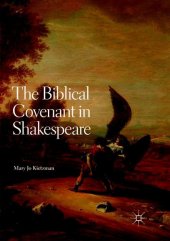 Neuerscheinungen 2019Stand: 2020-02-01 |
Schnellsuche
ISBN/Stichwort/Autor
|
Herderstraße 10
10625 Berlin
Tel.: 030 315 714 16
Fax 030 315 714 14
info@buchspektrum.de |

Mary Jo Kietzman
The Biblical Covenant in Shakespeare
Softcover reprint of the original 1st ed. 2018. 2019. xi, 254 S. 210 mm
Verlag/Jahr: SPRINGER, BERLIN; SPRINGER INTERNATIONAL PUBLISHING 2019
ISBN: 3-319-89109-X (331989109X)
Neue ISBN: 978-3-319-89109-5 (9783319891095)
Preis und Lieferzeit: Bitte klicken
The theo-political idea of covenant-a sacred binding agreement-formalizes relationships and inaugurates politics in the Hebrew Bible, and it was the most significant revolutionary idea to come out of the Protestant Reformation. Central to sixteenth-century theology, covenant became the cornerstone of the seventeenth-century English Commonweath, evidenced by Parliament´s passage of the Protestation Oath in 1641 which was the "first national covenant against popery and arbitrary government," followed by the Solemn League and Covenant in 1643. Although there are plenty of books on Shakespeare and religion and Shakespeare and the Bible, no recent critics have recognized how Shakespeare´s plays popularized and spread the covenant idea, making it available for the modern project. By seeding the plays with allusions to biblical covenant stories, Shakespeare not only lends ethical weight to secular lives but develops covenant as the core idea in a civil religion or a founding myth of the early-modern political community, writ small (family and friendship) and large (business and state). Playhouse relationships, especially those between actors and audiences, were also understood through the covenant model, which lent ethical shading to the convention of direct address. Revealing covenant as the biblical beating heart of Shakespeare´s drama, this book helps to explain how the plays provide a smooth transition into secular society based on the idea of social contract.
1. Introduction.- 2. Abraham´s Ordeal and Historical Change: From Sacrifice to Ethics.- 3.The Merchant of Venice: Shylock and Covenantal Interplay.- 4. Hamlet, Judge of Denmark, in a "Time. . .Out of Joint".- 5.Falstaff, Prophet of Covenant in The Henriad .- 6.Tragic Monarchy: Saul and Macbeth.- 7. Epilogue: Shakespeare and Milton Grapple with Kings.
"There are moments of insight in this book that deserve consideration, especially concerning the importance of covenant theology to early modern religious, political, and literary culture. Fundamentally, the book calls needed attention to an undervalued element of Reformation culture." (Thomas Fulton, Modern Philology, Vol. 117 (1), May, 2019)
Mary Jo Kietzman is Associate Professor of English at the University of Michigan-Flint, USA. She is the author of The Self-Fashioning of an Early-Modern Englishwoman: Mary Carleton´s Many Lives (2004). She has published numerous articles on a wide range of English Renaissance authors and subjects, including Shakespeare´s The Merchant of Venice, Twelfth Night, King Lear, Romeo and Juliet, and "The Rape of Lucrece."


